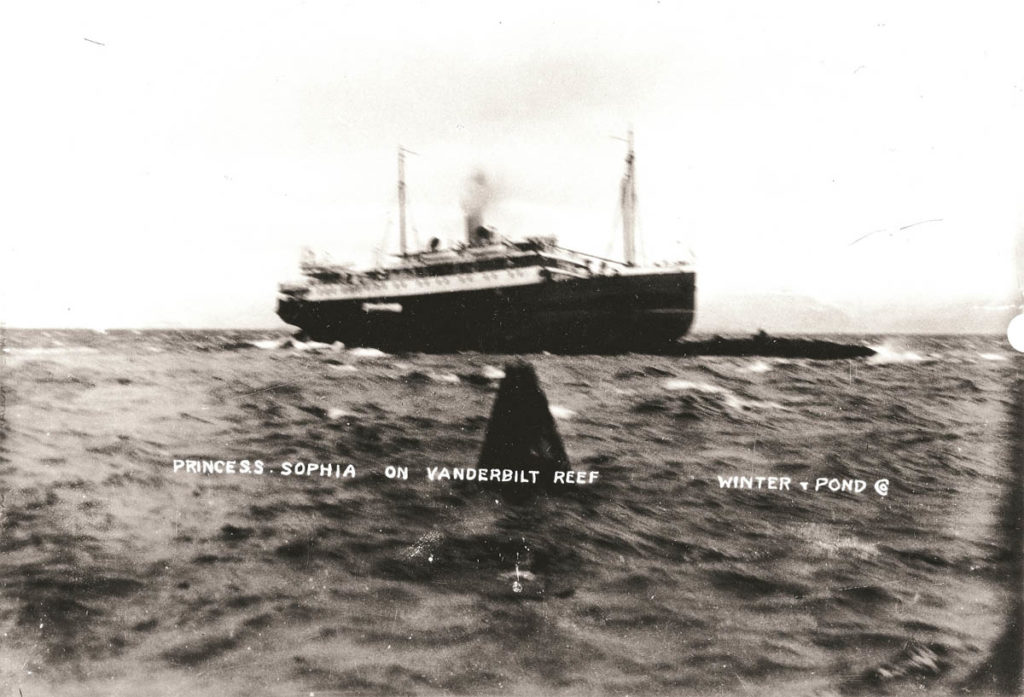The month of October is a reminder of the tragic sinking of the SS Princess Sophia on October 25, 1918 one hundred and two years ago. The Victoria-based ship transported passengers up the coast to Skagway, Alaska stopping at several coastal communities along the way. The shipwreck is the largest marine disaster along the northwest coast of North America and resulted in the unfortunate loss of everyone on board.

David Leverton, Executive Director of the Maritime Museum of BC has had an active interest in the marine disaster for many years and has co-authored a book with Judy Thompson that looks at the shipwreck and the background of the known passengers and crew who were onboard at the time of the sinking.
Mr. Leverton stated:
“The 100th Anniversary commemorating this event helped to increase public awareness about the story and we still continue to learn more about the mystery of what happened including the story surrounding the fate of the lone dog that was known to have survived the disaster.”
Several months after the tragic sinking, The Alaska Daily Empire on Thursday, March 6, 1919, reported that a small dog had been found two days after the shipwreck covered in oil in Tee Harbor which is about 20 miles away and that it had been living at the nearby Auk Bay Cannery. On March 14, 1919, The Alaska Daily Empire reported that the dog had been positively identified as a thoroughbred English Setter belonging to Captain James Alexander and his wife Louisa. The paper further reported that the General Agent for Canadian Pacific had followed up with Captain Alexander’s administrators regarding the dog. Apparently five dogs had been included in the ship’s manifest at the time of its departure from Skagway on the late evening of October 23, 1918 and this was the only survivor.
Last year the Maritime Museum of British Columbia received a copy of a letter that was found in the estate of Mrs. Candace Waugaman and later forwarded to author Ken Coates by the estate representative. Mrs. Waugaman was a philanthropist from Fairbanks, Alaska well known for her local philanthropic work that consisted of scanning eBay for Alaskan collectables and then holding a large sale of the items each year at her home to help support several local charities. The original copy of the letter was turned over to the Alaska and Polar Regions Collections and Archives at the University of Alaska, Fairbanks.
Related Article: Learn more about the SS Princess Sophia Disaster
The original letter had been forwarded to a gentleman by the name of Reginald Brock c/o the Engineer Mine in Atlin, BC on July 8th, 1919 by the Official Administrator of the Estate of the late James Alexander,
“to take possession of a dog reported having escaped from the wreck of the “Princess Sophia” to be now at Juneau, Alaska.”
For all these years the dog was reported to be an English Setter while according to the recently discovered letter, the dog was identified as a Chesapeake Bay Retriever named “Tommy.”
The discovery of this letter over 100 years later reopens the mystery of what happened to the one lone dog that survived the tragic sinking of the SS Princess Sophia and may help to explain why the dog was able to survive the frigid waters of the Lynn Canal in late October. The Chesapeake Bay Retriever is believed to be descended from two puppies that survived a Newfoundland shipwreck in 1807. The Chesapeake Bay Retrievers are powerful swimmers with webbed feet and a thick, water-shedding coat. This may explain why the dog was able to make it to shore and survive the sinking.
So now the question will always remain, was it an English Setter or was it a Chesapeake Bay Retriever?
Leverton indicated that,
“This will always remain a mystery like so many other aspects of this story. Although it seems quite plausible that it was a Chesapeake Bay Retriever we will never really know. The only thing for certain is that all of the passengers and crew on board along with all of the other animals sadly lost their lives in the early evening hours of October 25, 1918, and we’ll never really know the whole story of what happened on that fateful night. It will likely always remain a mystery.”







